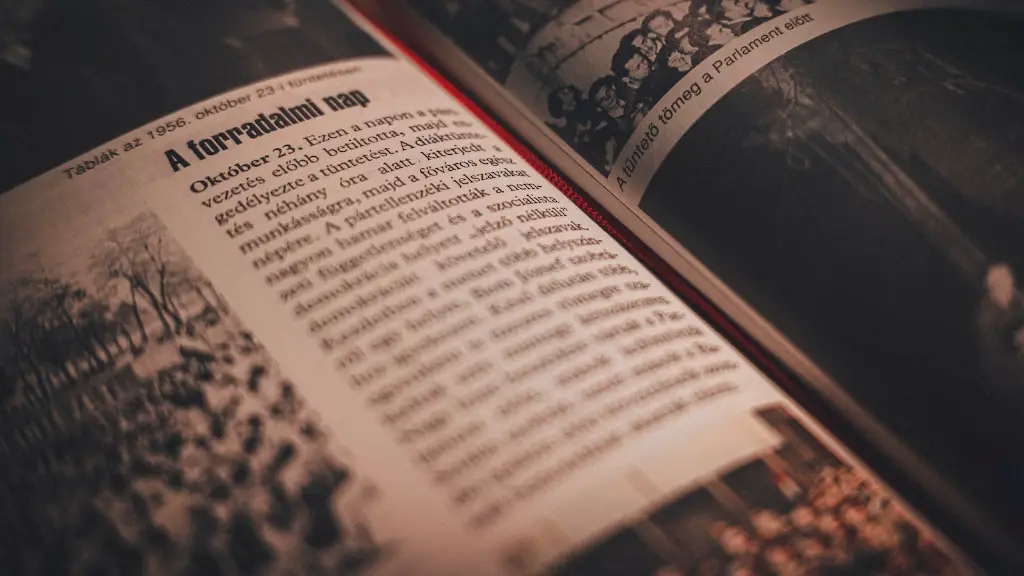Is Walt Whitman a Transcendentalist?
Poet and journalist Walt Whitman is widely acknowledged as one of the most influential and innovative American figureheads of the 19th century. Taking a unique and highly unconventional approach to his influential works, Whitman has been hailed as having had a radical impact on the American literary landscape. Among the numerous schools of thought and trends Whitman drew influences from, one particular style looms especially large – Transcendentalism. In this article, we seek to provide an analysis of the Transcendentalist ethos and examine how Whitman’s work aligns with such a philosophy.
Although Transcendentalism’s founding principles were established prior to Whitman’s birth in the early 19th century, the poet’s writings were nonetheless critically acclaimed as having been quintessentially infused with Transcendentalist sensibilities. Transcendentalism is a utopian philosophy premised upon seeking a harmony between nature, truth and personal self-realization. Nature is viewed as possessing ultimate truth and wisdom, while man is seen as containing the ability to attain self-realization through his intrinsic connection to the physical world. As influential Transcendentalist writer Henry David Thoreau states, “All good things are wild and free”.
Whitman’s reflections on nature and human life stand out prominently in his extraordinary works. Whitman was known for his lengthy and experimental pieces, from lengthy prose works such as “Leaves of Grass” to his many famous sonnets. Time after time, Whitman’s work revolves around the notion of our mutual interconnectedness with the natural world; from his poetic descriptions of rural farming life to his musings on the healing power of the shore. In his masterpieces, nature is not simply portrayed as a backdrop for his works, but indeed intertwined with man’s emotional and spiritual journey. Surveying Whitman’s extensive body of work, it is highly likely more than a few Transcendentalist maxims were obscured within his poetic musings.
At the other end of the spectrum, many critiques have emerged over the years, questioning Whitman’s Transcendentalist pedigree. While Whitman did indeed demonstrate a reverence and admiration for nature, his beliefs concerning religion and individuality often failed to adhere to traditional Transcendentalist tenets. While some, such as Emerson, possessed a strong religious streak, Whitman often expressed God and Nature as synonymous entities. While this outlook aligns with Transcendentalist ideas in essence, Whitman’s expression often raised eyebrows within the traditional Transcendentalist circles. Furthermore, Whitman was fiercely independent and believed in the unique autonomy of all individuals, at times writing works with a strongly expressed self-assertion that could come off as antithetical to the search for homogeneity in relationships with the natural world favoured by Transcendentalists.
Transcendentalism & Human Nature
At its core, Transcendentalism posits that Nature and Human Nature are one and the same. The ways we interact with the natural world, it argues, reflect the manner in which we interact and coexist with other human beings. Within this framework, Transcendentalist principles illustrate how simply existing in the natural world can inspire humanity towards personal and spiritual growth and enlightenment. In many of Whitman’s works, spirituality and nature intertwine to form a spiritual relationship between man and the natural world. An example comes in the form of Whitman’s 1850 piece, “To a Locust Tree in Flower”, in which the poet gives a detailed poetic portrait of a locust’s blooming, praising the beauty of nature in the process.
In “To a Locust Tree in Flower,” Whitman adopts the persona of both a lover yearning for his beloved, and an observer of nature. The Locke Tree becomes a metaphor for a romantic connection between the human and divine; hence, the transcendental blending of humanity with nature. Further Whitman works, such as “When Lilacs Last in the Dooryard Bloom’d” and “Out of the Cradle Endlessly Rocking” also illustrate a reconciliation between the earthly and spiritual planes. In telling his stories of man-nature communion, Whitman creates a complex relationship between the two entities, instead of simply seeing them as separate. Thus, Whitman demonstrates an intimate understanding of the Transcendentalist philosophy, whereby nature and human life are entwined in balance.
Whitman’s Reception & Criticism
Owing to the huge stylistic innovation and fresh perspective Whitman brought in his works, he is widely accepted as a bridge between classical Transcendentalism and the later schools of thought and trends that followed. Nonetheless, Whitman declared himself independent of any single school of thought, forming his own unique brand of writing. Despite competing views concerning the individual liberties and rights which are both present and absent from Whitman’s works, his authorship is—on balance—acknowledged as reflective of Transcendentalist principles. It is also noted how Whitman himself was heavily inspired by the likes of Emerson and Thoreau — two of the leading figures in Transcendentalism.
Critics such as Professor M. Wynn Thomas have suggested that Whitman’s vision and outlook towards life, self and the world is inevitably Transcendentalist in essence. Prof. Thomas has explained that, “at the very least, Whitman seems to have a sense of what we call Transcendentalist affirmation, a kind of heroic self-confidence, which derives from his appreciation of the powers of poetry and from his determination to use those powers in order to engage with and become part of the continuity of life”. Yet, for all of his admiration of the Transcendentalist School, Whitman eventually emerged as an independent thinker—one who sought to forge his own unique vision.
Adapting & Developing Transcendentalism
Whitman’s work displays an appreciation for Transcendentalist philosophy, yet it also demonstrates a modified, individualistic outlook on several of its precepts. Whereas traditional Transcendentalists firmly believed in the rights of an individual and the pursuit of individual happiness, Whitman was more interested in the motivations and goals of society as a collective. His works reflect a writer who is interested in examining how nature and human life can work together in order to create a truly beautiful, harmonious, and harmonizing world. Whitman continues to inspire generations of modern day writers and thinkers with his work, and yet his influence remains strongly intertwined with the Transcendentalist ethos of interconnectedness, spirituality and a reverence for nature.
Whitman’s Political & Social Views
Whitman’s works often discuss equality, democracy, and freedom of choice – topics that remain core aspects of American societal values today. Whitman believed in reducing class stratification in America and talking about ways to achieve gender equality. This reflects Transcendentalists’ views that the universe is a manifestation of the divine, as well as the conviction that each individual has an inner god-spark that should be celebrated rather than restricted. In essence, Whitman sought to extend the traditional Transcendentalist focus on the individual’s connection to the divine to the collective society by focusing on societal and structural issues.
In his works he advocated for embracing individual diversity, supported decentralization of power, and associated transcendentalism with universal love for humanity. Whitman stated that “the fellow who can find something to love in the world—the hills, mountains, streams, trees, animals—is happier and more have with less money. Such a one is not superficial nor deceitful, nor has he to spend much time on the treadmill of life, or at the desk or counter”. Whitman, like many Transcendentalists, did not focus solely on individual awareness, but rather held up the idea of a collective awakening allowing for inner peace and societal progress.
Whitman as Revolutionary Rebel
Whitman sits comfortably within a long line of influential authors who were strongly informed by the tenets of Transcendentalism. For instance, Revolutionary philosopher Thomas Paine, who was a key influence on 18th Century American Revolutionary thinking, was also greatly influenced by Transcendentalism. Expounding upon this idea, Whitman took a firm stance against traditional notions of liberty, embracing the concept of individual liberty over that of institutionalized authority. In his works, Whitman sought to promote a shift in the way individuals were able to interact with the world, with a focus on freedom of speech, expression, and conscience. He advocated for democracy and strongly derided classism and elitism, suggesting that restrictive, oppressive culture could cause inner turmoil and oppression.
Furthermore, Whitman also wrote about personal autonomy and the pursuit of one’s own happiness, without the need for external validation. His works frequently delve into the ambiguity and chaos of life, depicting human emotions and experiences that are often openly rejected or overlooked by mainstream culture. Whitman’s work often sought to challenge traditional religious and social norms in an effort to awaken readers from the tyranny of the accepted “truths” of a strict, hierarchical society. In this regard, Whitman can be referred to as a revolutionary rebel, one who sought to empower individuals to break free of what he saw as oppressive, restrictive, and uniform structures.
Conclusion
Overall, Walt Whitman stands out as one of the foremost American authors of the 19th Century, being notably recognised for his poetic approach to romance, nature, time and life in general. Such writings often display a strong undercurrent of Transcendentalist principles, thereby demonstrating Whitman’s appreciation for such a school of thought. While a few of Whitman’s works may adhere to traditional Transcendentalist principles, his writings present an interpretation of the philosophy that is innovation and wholly individualistic. In his works, the poet seeks to demonstrate how nature and human life coexist symbiotically, each complementing the other – a perspective integral to the Transcendentalist ethos.



